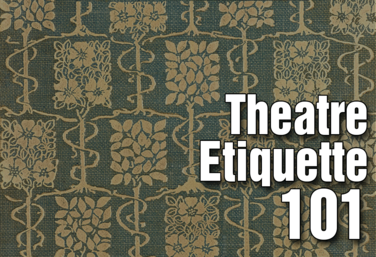Courses

PD COURSE
Theatre Etiquette 101
by Kerry Hishon
Instructor Kerry Hishon is an actor, director, writer, and stage combatant with years of experience in youth theatre. Her course, Theatre Etiquette 101, is designed to help students be successful in their theatrical journeys.
When teaching students who are brand new to theatre, it’s important to discuss and apply the expectations of the drama classroom and the theatrical world.
This course starts by explaining "what is theatre etiquette", and then moves through every step in the production process from audition to post-show recovery.
Every module has tips for both you and your students, classroom exercises, rehearsal exercises, and reflections. There are also printable posters included to use in your classroom or backstage.
Read More
about Theatre Etiquette 101
Read Less
about Theatre Etiquette 101
Units

UNIT
Theatre Etiquette
by Kerry Hishon
When teaching students who are brand new to theatre, it’s important to discuss and apply the expectations of the drama classroom and the theatrical world. How do you implement and instill theatre etiquette in your classroom and your rehearsals – before a show and backstage? A cohesive theatrical community starts with the rules and codes of behaviour both onstage and off.
Topics covered within the unit include: What is Etiquette, Real World vs Theatre World Etiquette, Audience Etiquette, Audition Etiquette, Pre-Show and Performance Etiquette. The unit ends with a culminating activity which included a rubric and reflection.
Read More
about Theatre Etiquette
Read Less
about Theatre Etiquette
Resources
RESOURCE
Poster: Audition Etiquette
A printable poster for the drama classroom or backstage.
Read More
about Poster: Audition Etiquette
Read Less
about Poster: Audition Etiquette
Attachments
RESOURCE
Poster: What's Your Call Time
A printable poster for the drama classroom or backstage.
Read More
about Poster: What's Your Call Time
Read Less
about Poster: What's Your Call Time
Attachments
RESOURCE
Poster: Respect This Space
A printable poster for the drama classroom, scene shop, or backstage.
Read More
about Poster: Respect This Space
Read Less
about Poster: Respect This Space
Attachments
RESOURCE
Poster: Respect the Crew
A printable poster for the drama classroom, scene shop, or backstage.
Read More
about Poster: Respect the Crew
Read Less
about Poster: Respect the Crew
Attachments
RESOURCE
Poster: Respect the Cast
A printable poster for the drama classroom or backstage.
Read More
about Poster: Respect the Cast
Read Less
about Poster: Respect the Cast
Attachments
RESOURCE
Poster: Quiet Backstage
A printable poster for backstage.
Read More
about Poster: Quiet Backstage
Read Less
about Poster: Quiet Backstage
Attachments
RESOURCE
Poster: Props are Not Toys
A printable poster for backstage or scene shop.
Read More
about Poster: Props are Not Toys
Read Less
about Poster: Props are Not Toys
Attachments
RESOURCE
Poster: Precheck
A printable poster to remind students to do a pre-check.
Read More
about Poster: Precheck
Read Less
about Poster: Precheck
Attachments
RESOURCE
Poster: Have Fun and Tell the Story
A printable poster for backstage reminders.
Read More
about Poster: Have Fun and Tell the Story
Read Less
about Poster: Have Fun and Tell the Story
Attachments
RESOURCE
Poster: Did you Hang up your Costume?
A backstage/scene shop reminder for student actors - printable poster.
Read More
about Poster: Did you Hang up your Costume?
Read Less
about Poster: Did you Hang up your Costume?
Attachments
RESOURCE
Poster: Did you Warm up?
A backstage reminder for student actors - printable poster.
Read More
about Poster: Did you Warm up?
Read Less
about Poster: Did you Warm up?
Attachments